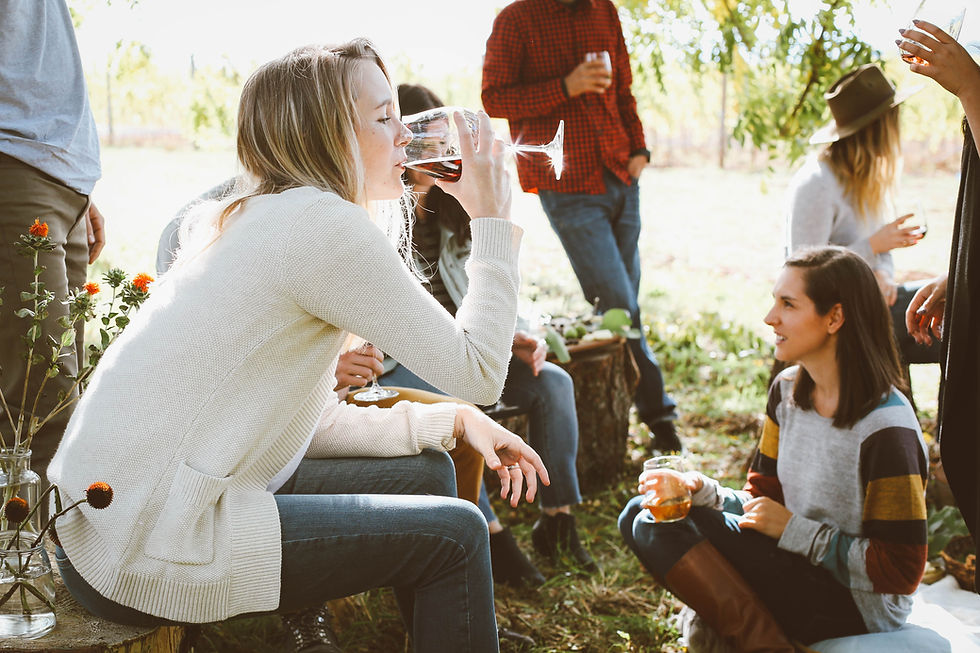
Wine is the oldest form of recorded alcohol dating back to 7000-6600 BC from China. The art of winemaking has obviously evolved tremendously since then! Trends in technology, climate change/sustainability, health aspects, market trends and social consumer needs are driving the future of the wine business. Let's take a minute to chat about what's next in this sipping sensation.
Technology is your friend...even in the wine business!
From the winery to the consumer's table, technology is a driving force. In the vineyards, drones with multispectral & thermal infrared cameras are being used to assist the experts on the ground. These drones can spot water status, signs of disease, signs of pests, smoke contamination from brush fires, plants that need to be replaced and estimating quality & yield. These drones can cover 45 hectares (111.197 acres) in fifteen minutes! Data is collected and put into reports within days. This makes for greater efficiency for growers to plan for a season more effectively.
Can we make wine and the wine business sustainable?
The answer is YES! As with technology the wine industry has come a long way from crushing grapes with your feet! The are so many different certifications to look for, so what do they all mean? Well, we cannot possible keep your attention that long so I'd like to dive into the three main categories I find the easiest. Organic, everyone loves the word, but there seems to be so many different levels. For wine, in a nutshell, is purity of a product using non-synthesized

ingredients. There is a difference between USDA Organic and EU Organic. These wines are made with organically grown grapes, all additives are organic with no GMO's or sulfites. EU Organic definition does allow for 100 ppm (parts per million) for red wines and 150 ppm for whites/rose'. I just want to mention that sulfites in wine seem to be given shade and in my opinion unfairly. Sulfites are currently the best option to keep the shelf or cellar life longer. You will find that USDA Organic wines are not meant to age. While wine sulfites seems to be bad, maybe people do not realize that they are in many processed foods at a much higher level and the percentage of people affected by sulfites is still very low. Lastly, sulfites are not the cause of that red wine headache! So, lets dive into sustainability and what it means. Sustainability is the mitigation & reduction of wastefulness in winemaking. This is a really important one due to the increasing talks of climate change. Technology is helping winemakers in this subject too. This effort is the increased focus on water and energy efficiency of the winery. There are so many sustainability certifications out there from each country, states and regions. Too many to talk about actually, as I want you to keep reading. Onwards and upwards to Biodynamics! Sounds a little fruity, no pun intended, but biodynamics is a side bar to

sustainability. It is holistic agricultural health. This practice has been in use for a century or so! It's vineyard (soil) health based on timing the planting, watering, pruning and picking based on lunar cycles. Some use herbs and bones to prepare the soil. If you are looking for Vegan wines, may need to watch out for that. There are only two certifications currently reflecting this practice. That is Biodyvin and Demeter. So covering the main three topics, there are also studies and changes going into eco-friendly packaging and reducing our carbon footprint. The wine lovers must consider all these things that add a few bucks to each bottle of wine they consume!
Marketing strategies and adapting to consumer wants and needs.

If you haven't ever marketed a new brand of anything, you may not know it is quite the undertaking. With all the information online it is a lot to contend with. Being on social media, all of them is pretty hard to do if even feasible. Getting a celebrity or influencer is also a trend these days. Creating sampling events and experiences are still in high demand and costly! We have so many different ways to market to the generations. (Gen X, Millennials, Gen Z...apparently we already have the boomers locked down they say). I still feel like while all the information above is important, wine lovers generally start later in life. Just because the younger crowd isn't swooning over wine right now, doesn't mean we have to think the industry from many thousands of year ago is coming to a close. We have actually made huge strides in drinking wine in different ways such as wine cocktails!
The future is looking bright for wine!
If you don't feel that way, I'd love to get your opinion! We clearly are making strides in the industry for the good! Consider wine's history and age, if I were a betting woman, we are gonna do just fine. Cheers, Saludi, Salut, Prost!!

Comments